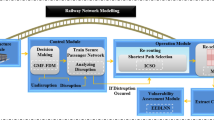Abstract
The ability to efficiently reschedule the trains when disturbances occur is one among the vital factors in attaining higher punctuality on railway traffic systems. Numerous techniques were developed to carry out train rescheduling, but the existing methodologies don't consider the probability of conflicts (or) disturbance analysis (DA). Thus, in this paper, an efficient method of train rescheduling (TRS) system is proposed utilizing the Brownian motion weighted-based salp swarm optimization (BMW-SSO) algorithm. The proposed technique follows two processes: (i) DA and (ii) rescheduling. Primarily, the track detail is collected as an input, and the disturbances are identified utilizing the modified weight-based deep learning neural network. If any disturbance occurs, then the TRS process is performed utilizing the BMW-SSO. Aimed at this, the current timetable is utilized as an input, and some constraints are extracted from the input utilizing multi-choice mixed integer goal programming. After that, finally, the BMW-SSO chooses and optimizes the best constraints from the extracted constraints as well as reschedules the timetable. Here, the BMW-SSO alternatively chooses the best third rescheduling timetable. Subsequent to generating TRS, the first rescheduled timetable’s feasibility is checked centred on the dictionary-centred checking technique. If the first rescheduled timetable is feasible, then it is signified as the optimal timetable. Otherwise, the second-created rescheduled timetable is utilized. And if the second one is unfeasible, then the thirdly created timetable is utilized. At last, the experiential examination confirms the proposed train timetable rescheduling (TTR) system’s performance regarding the timetable deviation, operation cost, along with dwell time. The proposed TTR consumes low time while analogized with the scheduled table.








Similar content being viewed by others
References
Huo J, Wu J, Kang L, Wang B (2016) Railway timetable rescheduling based on priority and train order entropy. J Comput Civ Eng 30(5):04016006
Toletti A, Laumanns M, Weidmann U (2019) Coordinated railway traffic rescheduling with the Resource Conflict Graph model. J Rail Transp Plan Manag. https://doi.org/10.1016/j.jrtpm.2019.100173
Ning L, Li Y, Zhou M, Song H, Dong H (2019) A deep reinforcement learning approach to high-speed train timetable rescheduling under disturbances. In: IEEE intelligent transportation systems conference (ITSC), IEEE, pp 3469–3474. https://doi.org/10.1109/ITSC.2019.8917180.
Dollevoet T, Huisman D, Kroon LG, Veelenturf LP, Wagenaar JC (2017) Application of an iterative framework for real-time railway rescheduling. Comput Oper Res 78:203–217. https://doi.org/10.1016/j.cor.2016.08.011
Lee W-H, Yen L-H, Chou C-M (2016) A delay root cause discovery and timetable adjustment model for enhancing the punctuality of railway services. Transp Res Part C EmergTechnol 73:49–64. https://doi.org/10.1016/j.trc.2016.10.009
Binder S, Maknoon Y, Bierlaire M (2017) The multi-objective railway timetable rescheduling problem. Transp Res Part C EmergTechnol 78:78–94. https://doi.org/10.1016/j.trc.2017.02.001
Cacchiani V, Huisman D, Kidd M, Kroon L, Toth P, Veelenturf L, Wagenaar J (2014) An overview of recovery models and algorithms for real-time railway rescheduling. Transp Res Part B Methodol 63:15–37. https://doi.org/10.1016/j.trb.2014.01.009
Zhu Y, Goverde RMP (2019) Railway timetable rescheduling with flexible stopping and flexible short-turning during disruptions. Transp Res Part B Methodol 123:149–181. https://doi.org/10.1016/j.trb.2019.02.015
Fabio D, del Cacho Estil-les M, Bersani C, Sacile R, Zero L (2018) Train scheduling and rescheduling model based on customer satisfaction. Application to Genoa railway network. In: 13th annual conference on system of systems engineering (SoSE), IEEE, pp 593–600. https://doi.org/10.1109/SYSOSE.2018.8428780
Shakibayifar M, Sheikholeslami A, Corman F, Hassannayebi E (2017) An integrated rescheduling model for minimizing train delays in the case of line blockage. Oper Res Int Journal. https://doi.org/10.1007/s12351-017-0316-7
Cavone G, Dotoli M, Epicoco N, Seatzu C (2017) A decision making procedure for robust train rescheduling based on mixed integer linear programming and Data Envelopment Analysis. Appl Math Model 52:255–273. https://doi.org/10.1016/j.apm.2017.07.030
Xie M, Li X (2012) Railway timetable rescheduling based on the feedback of train-set circulation. ProcediaSocBehavSci 43:781–789. https://doi.org/10.1016/j.sbspro.2012.04.152
Herrigel S, Laumanns M, Szabo J, Weidmann U (2018) Periodic railway timetabling with sequential decomposition in the PESP model. J Rail Transp Plan Manag 8(3–4):167–183
Li X, Shou B, Ralescu D (2014) Train rescheduling with stochastic recovery time: a new track-backup approach. IEEE Trans Syst Man CybernSyst 44(9):1216–1233
Eaton J, Yang S, Gongora M (2017) Ant colony optimization for simulated dynamic multi-objective railway junction rescheduling. IEEE Trans Intell Transp Syst 18(11):2980–2992
Fischetti M, Monaci M (2017) Using a general-purpose mixed-integer linear programming solver for the practical solution of real-time train rescheduling. Eur J Oper Res 263(1):258–264
Xu P, Corman F, Peng Q, Luan X (2017) A train rescheduling model integrating speed management during disruptions of high-speed traffic under a quasi-moving block system. Transp Res Part B Methodol 104:638–666. https://doi.org/10.1016/j.trb.2017.05.008
Kuppusamy P, Venkatraman S, Rishikeshan CA, Padmanabha Reddy YCA (2020) Deep learning based energy efficient optimal timetable rescheduling model for intelligent metro transportation systems. PhysCommun. https://doi.org/10.1016/j.phycom.2020.101131
Author information
Authors and Affiliations
Corresponding author
Ethics declarations
Conflict of interest
All authors declare that they have no conflict of interest.
Human and animals rights
This article does not contain any studies with human participants or animals performed by the authors.
Informed consent
This is not applicable for the study presented.
Additional information
Communicated by Vicente Garcia Diaz.
Publisher's Note
Springer Nature remains neutral with regard to jurisdictional claims in published maps and institutional affiliations.
Rights and permissions
About this article
Cite this article
Kumar, N., Mishra, A. An efficient method of disturbance analysis and train rescheduling using MWDLNN and BMW-SSO algorithms. Soft Comput 25, 12031–12041 (2021). https://doi.org/10.1007/s00500-021-05708-2
Accepted:
Published:
Issue Date:
DOI: https://doi.org/10.1007/s00500-021-05708-2




